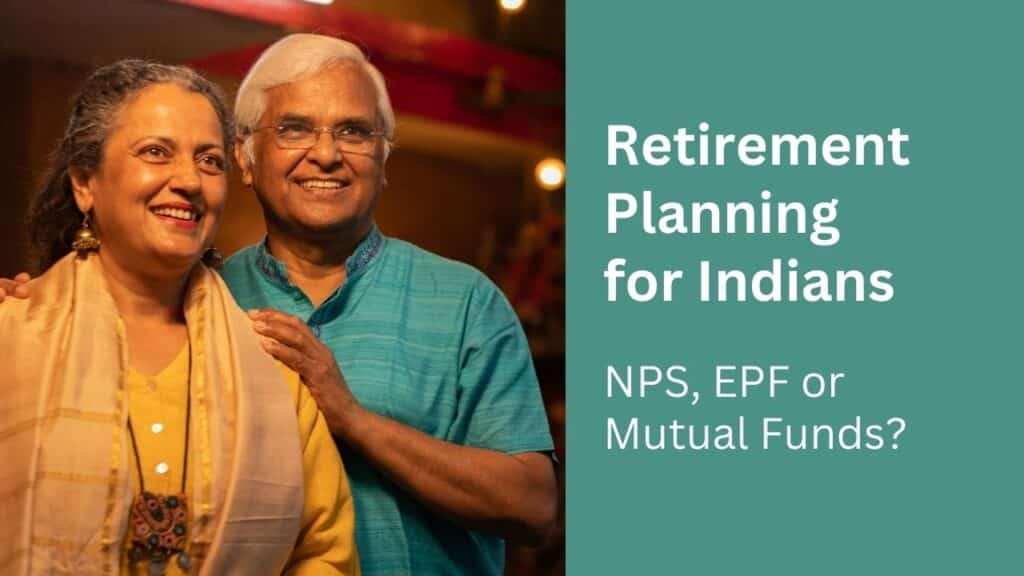Breaking Down the Best Options for a Secure Future
Retirement planning is no longer a luxury but a necessity for Indians. With life expectancy rising to 72.6 years (2023) and the shift toward nuclear families, building a robust retirement corpus is critical. The big question: Should you rely on the Employee Provident Fund (EPF), the National Pension System (NPS), or Mutual Funds? Let’s explore these options with real-world examples, data, and actionable insights to help you decide.
1. Employee Provident Fund (EPF): The Safety Net
How It Works?
EPF is a mandatory savings scheme for salaried employees. Both you and your employer contribute 12% of your basic salary + DA monthly. For FY 2023-24, the EPF interest rate is 8.15%, compounded annually.
Why It’s Popular?
- Guaranteed Returns: The government backs EPF, making it one of India’s safest investments.
- Tax Benefits: Contributions (up to ₹1.5 lakh under Section 80C), interest earned, and withdrawals (after 5 years) are tax-free.
- Forced Savings: Automatic salary deductions ensure discipline.
The Catch
- Limited Growth: Returns barely outpace inflation (India’s average inflation is ~6%).
- Liquidity Limits: Partial withdrawals are allowed only for emergencies like medical needs or home loans.
Consider this, Ravi, a 30-year-old earning ₹50,000/month, contributes ₹12,000 monthly (including his employer’s share) to EPF. Assuming his salary grows 5% annually, by age 60, his EPF corpus would reach ₹5.2 crore at 8.15% returns. While this seems massive, inflation could erode its purchasing power over decades.
2. National Pension System (NPS): Tax Efficiency Meets Market-Linked Growth
How It Works?
NPS is a voluntary, long-term retirement scheme where you can allocate funds to equity (up to 75%), corporate bonds, or government securities. At retirement, 40% of the corpus must be used to buy an annuity (a regular pension), while 60% can be withdrawn tax-free.
Why It’s Unique?
- Tax Benefits: Enjoy an extra ₹50,000 deduction under Section 80CCD(1B), beyond the ₹1.5 lakh limit of Section 80C.
- Low Costs: Fund management charges are as low as 0.01%, making it cost-effective.
- Flexibility: Choose between aggressive (equity-heavy) or conservative (debt-heavy) portfolios.
The Catch
- Annuity Taxation: The monthly pension from the annuity is taxable as income.
- Market Risk: Equity exposure can lead to volatility in returns.
Consider this – Priya, 30, invests ₹10,000/month in NPS, splitting her portfolio equally between equity and debt. With an average return of 10% annually, her corpus would grow to ₹2.2 crore by age 60. She uses 40% (₹88 lakh) to buy an annuity, giving her a taxable pension of ~₹50,000/month (at a 6% annuity rate). The remaining ₹1.32 crore is tax-free.
3. Mutual Funds: High Growth, Higher Risk
How They Work?
Mutual funds pool money from investors to buy stocks, bonds, or other assets. Equity funds (like large-cap or flexi-cap) have historically delivered 12-15% annual returns over 10+ years. Popular retirement-focused options include ELSS (tax-saving funds) and index funds.
Why They Shine?
- No Withdrawal Restrictions: After the lock-in period (e.g., 3 years for ELSS), you can access your money anytime.
- Inflation-Beating Returns: Equity funds outperform EPF and NPS over the long term.
- Full Control: Unlike NPS, the entire corpus is yours at retirement.
The Catch
- Market Volatility: Short-term fluctuations can unsettle new investors.
- Taxes: Long-term capital gains (LTCG) above ₹1 lakh are taxed at 10%.
Take the example of Arjun, 30, who invests ₹10,000/month in a diversified equity mutual fund. At 12% annual returns, his corpus grows to ₹3.5 crore by 60. After paying 10% tax on gains over ₹1 lakh, he retains ~₹3.15 crore. This corpus offers flexibility but requires discipline to stay invested during market dips.
Comparing EPF, NPS, and Mutual Funds
Returns
- EPF: Safe but modest returns (~8-8.5%).
- NPS: Balanced returns (~8-12%) depending on equity exposure.
- Mutual Funds: Higher growth potential (~12-15%) but with market risk.
Risk
- EPF is safest, followed by NPS (moderate risk), and Mutual Funds (highest risk).
Taxation
- EPF: Tax-free at all stages (EEE).
- NPS: Tax-free withdrawals (60%), but annuity income is taxed.
- Mutual Funds: LTCG over ₹1 lakh taxed at 10%.
Liquidity
- EPF allows partial withdrawals for emergencies.
- NPS Tier-I is locked until 60, but Tier-II offers liquidity.
- Mutual Funds are liquid after the lock-in period.
Corpus Accessibility
- EPF: Full lump sum at retirement.
- NPS: 60% lump sum + 40% annuity.
- Mutual Funds: Entire corpus is accessible.
Which Option Works Best?
Assume you invest ₹10,000/month for 30 years:
- EPF: At 8.15% returns, you’d accumulate ₹5.2 crore. Safe but may struggle to beat inflation long-term.
- NPS: At 10% returns, you’d get ₹2.2 crore + ₹50,000/month pension. Balances growth and safety but mandates annuity.
- Mutual Funds: At 12% returns, you’d have ₹3.5 crore (post-tax). Maximizes wealth but demands risk tolerance.
EPF suits risk-averse investors, NPS offers tax efficiency, and mutual funds are ideal for wealth creation.
The Smart Hybrid Strategy
Combine all three for a balanced portfolio:
- EPF (40% of savings): Build a secure base.
- NPS (30%): Leverage tax benefits and moderate growth.
- Mutual Funds (30%): Chase higher returns.
Example: Investing ₹30,000/month (split as above) could create a retirement corpus of ₹4-5 crore + pension income, offering both safety and growth.
Key Takeaways
- Start Early: A 30-year-old investing ₹10,000/month can retire with crores.
- Diversify: Use EPF for safety, NPS for tax savings, and mutual funds for growth.
- Review Annually: Adjust allocations based on market trends and life goals.
There’s no one-size-fits-all answer. EPF is a must for salaried individuals, NPS complements it with tax perks, and mutual funds help bridge the inflation gap. For millennials, a mix of all three—with a tilt toward equities—can ensure a retirement that’s both secure and comfortable.


